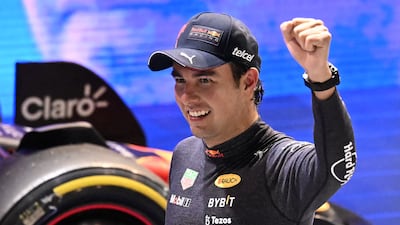Formula One returns to Suzuka after a three year absence with Max Verstappen taking another crack at winning his second world title.
It is a reflection of the Dutchman’s dominance that can have as disastrous a race as he did at Marina Bay - equalling his worst finish of the season - and still be within striking distance of title number two.
Engine suppliers Honda have upped the ante with an increased sponsorship running to tens of millions to have their name on the car once again in the expectation of a championship victory at the home circuit they own.
And a much anticipated return it is to at a venue as adored by fans as it is by the F1 drivers themselves. The hilly demanding figure of eight track is among the greatest on earth.
In an age of neutered modern F1 circuits where show appears to have priority over sport, old-school Suzuka stretches the drivers’ every nerve and fibre from the fast T1 hairpin to the snaking S curves that require so much precision, through Degner, Spoon and the legendary 130R, taken at speeds approaching 300kph.
Suzuka is a circuit drenched in iconic moments where the world championship has been won at least 11 times. From Ayrton Senna’s two controversial title-deciding smashes with Alain Prost to Mika Hakkinen’s second championship ahead of a crestfallen Eddie Irvine in 1999 and the start of Michael Schumacher’s five-year domination the following season.
Then there was the seminal James Hunt championship victory in 1976. After heroically coming back from a near death crash earlier in the year, rival Niki Lauda refused to race in a downfall of biblical proportions and the English bon vivant’s seesawing fortunes saw him do just enough to become champion. That was Japan, of course, but Fuji and not Suzuka.
Suzuka’s flowing contours have just two real braking points on what is one of the five fastest circuits on the calendar. Strangely it has just one DRS zone, a feature shared with just one other circuit, the unlikely bedfellow of super slow Monte Carlo.
Together with the love of Suzuka comes sombre memories of F1’s last fatal accident in 2014. Jules Bianchi, one F1’s rising stars, hit a recovery vehicle under Safety Car conditions and died from brain injuries nine months later without recovering consciousness.
The death is felt all the more for the general recognition he was not only godfather and friend to popular Ferrari team leader Charles Leclerc but that this would have been his time; the era in which his exceptional talent would surely have been blooming.
Only four sessions in the last five Grands Prix have been affected by rain but it is expected again this weekend, increasing the chances of a fate-changing Safety Car period seen in less than half the events there.
That will be an extra factor Verstappen will have to juggle as he bids to win at the track for the first time.

The world champion’s task is relatively straight forward as he returns to the place where he made his debut in 2014 just days after his 17 birthday to become F1’s youngest driver.
Regardless of what his rivals do, the Dutchman can become champion if he wins and sets fastest lap, no minor feat but one he has already achieved five times this season.
If the natural order of things is disrupted - as it was last weekend - he has to score eight points more than Leclerc and six more than teammate Sergio Perez, on a hot streak after winning the last round.
Japan is expected to see the announcement of Pierre Gasly’s switch from AlphaTauri to Alpine to fill Fernando Alonso seat. That will trigger Nyck de Vries moving to the Italian outfit and, perhaps, Nico Hulkenberg ousting Mick Schumacher at Haas.
Part of the challenge of Suzuka is the eight hour time difference to Europe, meaning drivers have to be at their peak when they would normally still be in bed. Meal times and biorhythms are carefully measured by trainers using devices such as the increasingly popular Oura ring or temperature controlled bed covers.
As for the race, no-one has beaten Mercedes at Suzuka since the dawn of the hybrid era in 2014. Hamilton has won four times along with Nico Rosberg and Valtteri Bottas.
Given Mercedes’ form this year that is unlikely to continue. But can Verstappen be the one to change that and make Honda’s marketing dream come true?










